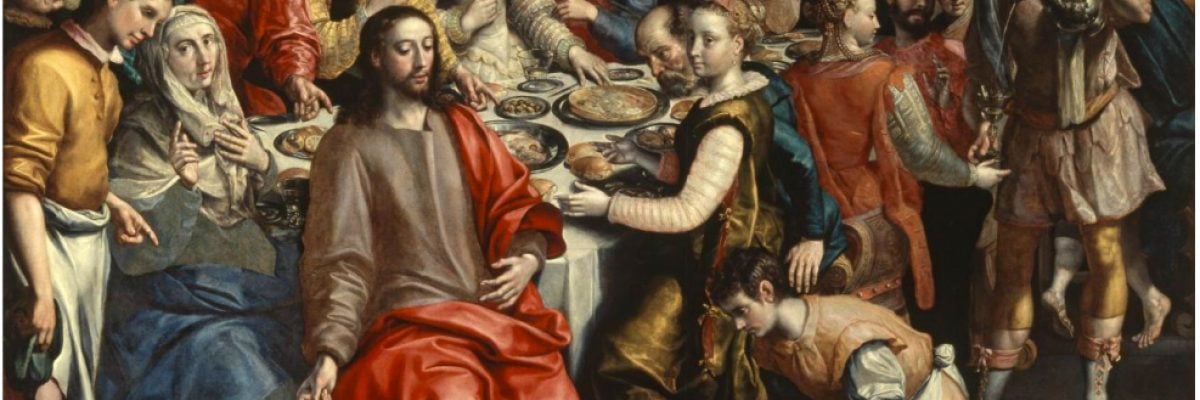
Homily for the Second Sunday in Ordinary Time, Year C
There was a wedding at Cana in Galilee,
and the mother of Jesus was there.
Jesus and his disciples were also invited to the wedding.
When the wine ran short,
the mother of Jesus said to him,
“They have no wine.”
And Jesus said to her,
“Woman, how does your concern affect me?
My hour has not yet come.”
His mother said to the servers,
“Do whatever he tells you.”
Now there were six stone water jars there for Jewish ceremonial washings,
each holding twenty to thirty gallons.
Jesus told them,
“Fill the jars with water.”
So they filled them to the brim.
Then he told them,
“Draw some out now and take it to the headwaiter.”
So they took it.
And when the headwaiter tasted the water that had become wine,
without knowing where it came from
—although the servers who had drawn the water knew—
the headwaiter called the bridegroom and said to him,
“Everyone serves good wine first,
and then when people have drunk freely, an inferior one;
but you have kept the good wine until now.”
Jesus did this as the beginning of his signs at Cana in Galilee
and so revealed his glory,
and his disciples began to believe in him.
— John 2:1-11
The miracle at the wedding feast at Cana, which crowns the threefold mystery celebrated in the Lord’s Epiphany and has been since distant antiquity the gospel lesson for this Sunday and still is read today in both forms of the Roman rite, is really unparalleled in its depth, simplicity, and completeness. Everything of importance to us Christians is here!
Let us let Our Lady take us by the hand and show us. First of all, she is a humble, normal woman of her time and place, with family connections and social duties such as weddings. And her own divine Son was the same, the honored new Rabbi with his students, invited, it seems, on account of their link with her. She had reared her Son well by example. Her family was not only to be entertained and honored but also to be of help. And so, she brings to her Son their need with words of utmost simplicity.
And here arises the most amazing contrast: she seems to command like a mother, but she is clearly aware of her Son’s divine power and nature. For him to be able to do anything about such a dire social gaffe in time for the hosts’ embarrassment to be hidden from the other guests would require miraculous powers more than human. Here we see the beauty and clarity of Our Lady’s mentality shine through: a perfectly normal woman with perfectly normal human sensibilities and manners who also possesses the knowledge and the power of a hidden mystery that utterly outstrips any normal human expectations and who nonetheless knows instinctively how to balance these orders of nature, grace, and the actions that join nature and supernature in a perfect harmony.
This is why we Christians have such trust in her intercession for our needs of soul and body. Her divine Son clearly asserts his superiority over her in his mission, and yet still does her bidding, as she knew he would. No fuss, no drama, no verbiage; only the work of the whole universe revealed in the ordinary events of human life, namely that he “reveal his glory” and that we believe in him so as to reach that glory through the intercessions of the Mother of God.
To confirm my words, accept, dear reader, as a little gift for the new year, these words of the Venerable Mary of Agreda from her Mystical City of God to inspire your confidence in the help of the Holy Virgin, our model and intercessor:
She possessed a most intimate knowledge of the nature, disposition, inclinations and bad habits of all men, of the time and occasion best suited to bring all to the way of eternal life, and that to this knowledge were added the most fervent prayers and the exquisite sweetness of her conversation. All these gifts were animated by her most ardent charity and the desire to bring souls to salvation and to the friendship of the Lord, and, therefore, the results of her labors were exceedingly great: she rescued innumerable souls, drawing them on and enlightening them. None of her petitions were denied her, and none of her efforts failed of the holy effects which she asked for them.
As, then, the work of salvation was the principal object of all her endeavors, she without a doubt performed greater deeds than can ever be understood by men in this mortal life. In all these labors the heavenly Lady proceeded with the greatest gentleness, like the simplest dove, with extreme patience and forbearance, overlooking the imperfections and rudeness of the new faithful; enlightening the ignorance of the vast number of those that came to subject themselves to the doctrines of the Redeemer. On all occasions she preserved a quiet high-mindedness, yet at the same time only she, in imitation of the Savior, could ever have joined with it such perfection of humility and sweetness. Between themselves they treated all with such great kindness and fullness of charity, that no one could ever be excused from humble subjection to such teachers. They spoke and conversed and ate with the disciples and with the women that followed them (Matt. 9, 10; John 12, 2; Luke 5, 29, 7, 36), observing all due moderation and reserve, so that no one found it strange, or doubted that the Savior was a true man, the natural and legitimate Son of the most holy Mary. It was for this purpose also that the Lord treated other guests with such affability, as is recorded in the holy Gospels.
Illustration: The Marriage at Cana (detail) by Maerten de Vos (c. 1596-97)



